A Complete Guide to Delta Fare Classes — and How to Score an Upgrade
Here's what you need to know about Delta One, Premium Select, Comfort+, and Main Cabin.
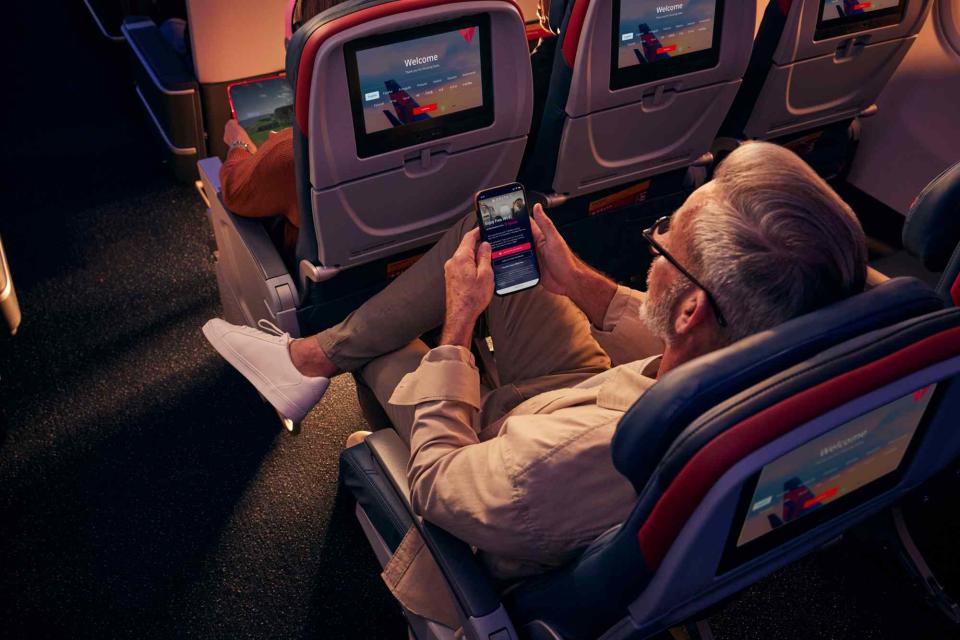
Courtesy of Delta
Flying Delta? Before you book your flight, take a look through our guide to Delta's cabin classes, which range from Delta One to basic economy. Discover the benefits associated with each class — and find out how to get upgraded from one to another using miles.
Cabin Classes on Delta
Delta One and Delta One Suites
Delta One is Delta's business-class product with lie-flat seats. (Delta One Suites are the same class of service, but the seats have a half-height sliding door for additional privacy.) These are most frequently used on transcontinental domestic flights as well as long-haul international routes.
Seats: While all Delta One seats are lie-flat, the specific design varies per aircraft, and some seats are better than others — some are quite old, offer little privacy, or require you to climb over your neighbor to reach the aisle. When booking a flight, you can usually look up what type of aircraft you'll be flying, but that's always subject to change before departure. You're not guaranteed a specific aircraft, and you might end up with an inferior Delta One seat if there's an equipment swap.
Meals: Delta One passengers are served plated hot meals; alcoholic beverages are complimentary.
Amenities: Delta One passengers receive an amenity kit with Grown Alchemist toiletries, noise-canceling headphones to use during the flight, and a mattress pad for the seat (on some flights).
Baggage Allowance: Delta One passengers can check two bags weighing up to 70 pounds each for free.
Other Perks: Delta One passengers are granted access to Delta's lounges, known as the Sky Club. They're also given Sky Priority check-in and early boarding.
Related: What to Know Before Flying Delta Air Lines, According to Passenger Reviews
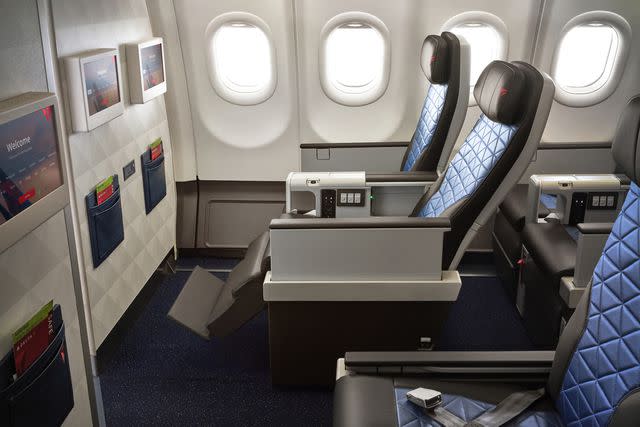
Courtesy of Delta
Premium Select
Premium Select is Delta's premium economy product. This is the newest cabin class, and it falls in between Delta One and Comfort+. Only some of Delta's fleet has this cabin — it's most commonly found on long-haul international routes.
Seats: Seats are not lie-flat, but they're more spacious and have a deeper recline than economy. They also have footrests for additional comfort.
Meals: Premium Select meals are not plated like those in Delta One, but they're more elevated compared to economy dishes. Alcoholic beverages are complimentary.
Amenities: Premium Select passengers enjoy a scaled-back version of the Delta One amenity kit — Grown Alchemist lip balm, an eye mask, a toothbrush and toothpaste, ear plugs, and socks — as well noise-canceling headphones. Bedding includes a memory foam pillow and a blanket.
Baggage Allowance: Premium Select passengers can check two bags weighing up to 50 pounds each for free.
Other Perks: At check-in, Premium Select passengers can use the Sky Priority desk, and they're given earlier boarding.
Related: These Airlines Have Some of the Best First- and Business-class Seats in the Skies Right Now
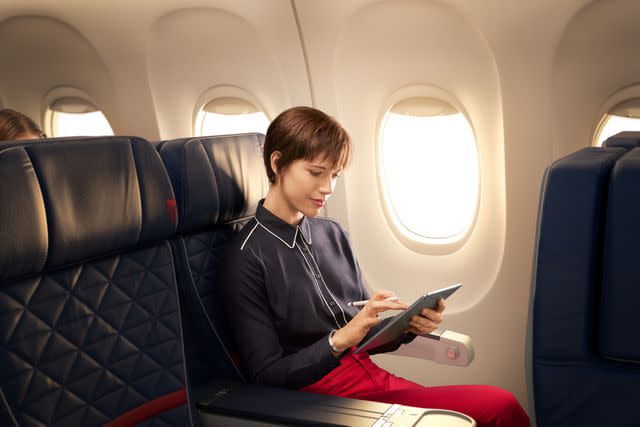
Courtesy of Delta
First Class
Delta's first class is the top cabin class on most domestic and short-haul international flights. (Delta planes don't have both Delta One and first class; they'll have one or the other.)
Seats: Seats are more akin to spacious armchairs, not like economy's benches with armrests. They do not lie-flat, but they do have extra recline.
Meals: Meal service depends on the distance of your flight and time of day. Some flights enjoy hot meals, others have cold dishes, and a few have extensive snack baskets.
Amenities: First-class passengers are given either earbuds or noise-canceling headphones, depending on the plane and route.
Baggage Allowance: First-class passengers can check two bags weighing up to 70 pounds each for free.
Other Perks: First-class passengers are given Sky Priority check-in and can board the aircraft first. They are not granted Sky Club access.
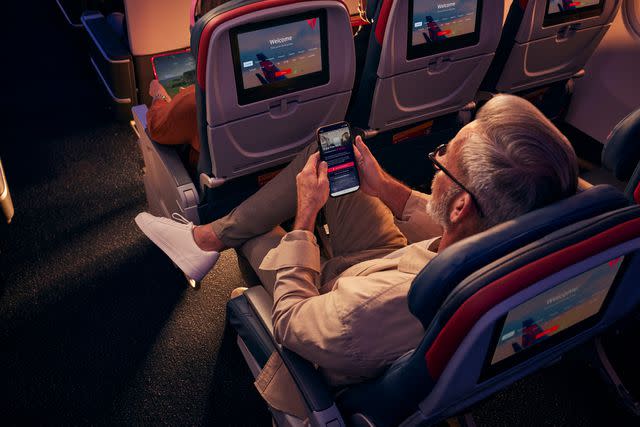
Courtesy of Delta
Comfort+
Comfort+ is technically in the economy cabin, but it offers a higher class of service and more legroom than Main Cabin seats. It can be found on all Delta aircraft on all routes.
Seats: The seats are standard economy seats, but they have more legroom than those in Main Cabin. They're also located in the front of the plane.
Meals: Meal service depends on the distance of your flight and time of day. On long-haul flights, you'll be served a hot meal; otherwise, you'll just be offered snacks. Most notably, alcoholic beverages are free for Comfort+ passengers.
Amenities: On long-haul international flights, Comfort+ passengers are given an eye mask and earplugs. On all flights, Comfort+ passengers are offered earbuds.
Baggage Allowance: If you're in Comfort+, you'll have to pay to check a bag. You can take a carry-on and personal item on board for free.
Other Perks: Comfort+ boards before passengers in Main Cabin.
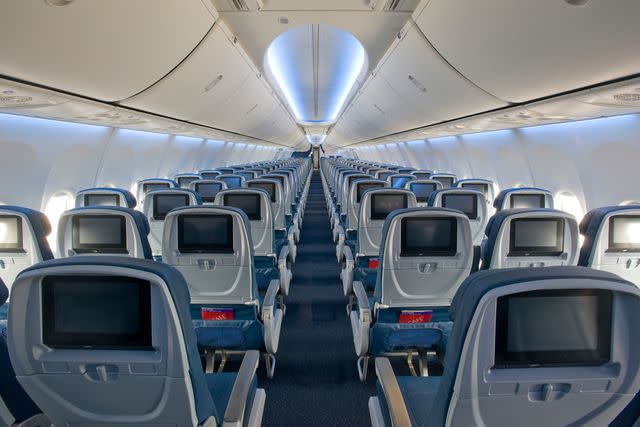
Courtesy of Delta
Main Cabin
Main Cabin is the standard economy class, found on all Delta planes on all routes.
Seats: You know the drill — economy seats are fairly small with limited legroom. Main Cabin passengers can pay to sit in an exit row for more space.
Meals: As with Comfort+, meal service depends on the distance of your flight and time of day: you'll either get a hot meal or snacks. Alcoholic beverages are available for purchase.
Amenities: Main Cabin passengers are given earbuds. On overnight flights, you may be offered a blanket and pillow.
Baggage Allowance: Main Cabin passengers are allowed one personal item and one carry-on bag; checked bags cost extra.
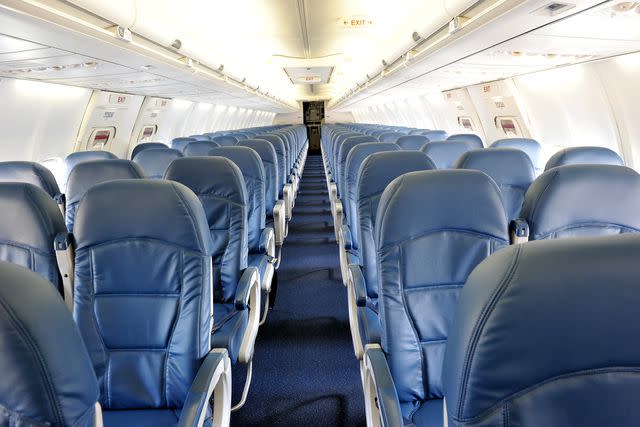
Courtesy of Delta
Basic Economy
Basic economy lies within the same area as Comfort+ and Main Cabin — that is, the economy cabin — but it's a heavily restricted and therefore discounted fare.
Seats: Basic economy seats are the same as those in Main Cabin.
Meals: Basic economy passengers are served the same meal as those in Main Cabin; alcoholic beverages can be purchased.
Baggage Allowance: You must pay for checked bags, but a carry-on and personal item are free.
Amenities: Basic economy passengers are given earbuds. On overnight flights, you may be offered a blanket and pillow.
Other Perks: There are no other perks given to basic economy passengers, unless you count the discounted fare.
How to Choose a Cabin Class
Choosing a cabin class is largely a personal choice, factoring in budget and comfort. The one rule we tend to stand by, though, is skipping basic economy if you your budget allows. It's the most restrictive ticket, as you won't be able to pick your seat in advance, meaning you'll likely end up in the middle, nor will you be able to earn frequent flier miles.
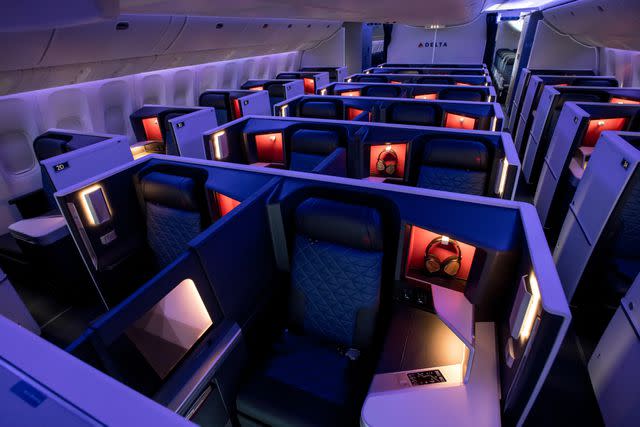
Courtesy of Delta
Fare Class Breakdown
If you thought you were only picking a cabin class, think again. Fare classes are specific codes that ultimately indicate the price and terms (whether you can get an upgrade, refund, or more) of a specific ticket. Within each cabin, there are numerous fare classes: With Delta, there are around 20 standard fare classes overall, plus a handful of exceptions such as ones for award tickets (that is, those booked with miles) and upgraded fares. Full-fare tickets cost more than discounted fare tickets, but it's really difficult to pick your fare class.
Delta's website typically shows one to two fare classes per cabin when booking online: fully refundable and non-refundable. "If you're looking for full-fare tickets you can generally buy those online, but if you need to specify a particular fare class, you'll need to call and speak to an agent," says Gary Leff, travel expert at View From the Wing.
Now, why does fare class even matter? For most fliers, it probably won't, as it's more of a technical detail for the airlines to manage inventory. But fare class sometimes does make a difference to those chasing status — higher fare classes command higher prices and therefore more Medallion Qualifying Dollars (MQDs), Delta's metric for earning elite status. So, if you're a status chaser, it might behoove you to book a higher fare class to earn more MQDs.
If you want to figure out your fare class, look for a letter in parentheses. "Once the search starts, Delta displays the actual fare code with a letter, say Z for discount business or D for more flexible business, typically at a higher price point," says Gilbert Ott, director of partnerships at Point.me.
How Miles Are Earned
Delta's loyalty program is called SkyMiles, and it's fairly straightforward to earn miles through it. Once you sign up for a free SkyMiles account, you will earn a certain number of miles per dollar spent on flights, regardless of your cabin class. But the number of miles does increase for those with elite status. Here are the SkyMiles earning rates based on status tier.
Status: SkyMiles Member; Miles Earned: 5 SkyMiles per $1 spent
Status: Silver Medallion; Miles Earned: 7 SkyMiles per $1 spent
Status: Gold Medallion; Miles Earned: 8 SkyMiles per $1 spent
Status: Platinum Medallion; Miles Earned: 9 SkyMiles per $1 spent
Status: Diamond Medallion; Miles Earned: 1 SkyMiles per $1 spent
How to Redeem Miles for Upgrades
After booking your ticket, you may be offered a chance to upgrade to a higher cabin class using cash or SkyMiles via the app or website — but not always. And if you're offered a deal, the rate presented might differ from your travel companion.
"Delta is among the best in the world with data collection and partner data sharing. The airline has been able to glean brilliant insights by understanding how people spend in their daily lives thanks to their Amex partnership, Starbucks, and more," says Ott. "This allows them to personalize offers based on a variety of factors to incentivize behavior. Some airlines can discern that a person has more to spend and if they just try the better experience, they might love it and buy it outright."
But because of this, it's not reliable to hold out for an award upgrade, since there's no regularity. "Delta doesn't want to make it easy and predictable to get a good buy-up offer, or else you'll just wait for that — they'd be undercutting their own pricing," says Leff. "Their goal is to extract revenue they wouldn't otherwise receive when discounting." So, if you really want that higher cabin class, your best bet is to pay up at the get-go.
And even if you're offered an award upgrade, is it a good deal in the first place? Well, it's better for your wallet to spend miles rather than dollars, but Delta SkyMiles isn't necessarily the most valuable rewards program out there.
"SkyMiles has done its best to reduce the value you're going to get for your points so that it's rare to get an outsized return. In my experience, Delta miles are worth less than those of most competitors," says Leff. "That's even frequently true when redeeming miles for partner business class awards, although the best value for SkyMiles awards is when your trip doesn't touch the United States — for example, Mexico to Europe rather than the U.S. to Europe."
There's no right or wrong way to spend your miles, so you'll have to weigh your specific situation before making any decisions. Ott says, "It really depends on the value being offered at the time, and how your cash finances relate to your Delta SkyMiles points balances."
For more Travel & Leisure news, make sure to sign up for our newsletter!
Read the original article on Travel & Leisure.

